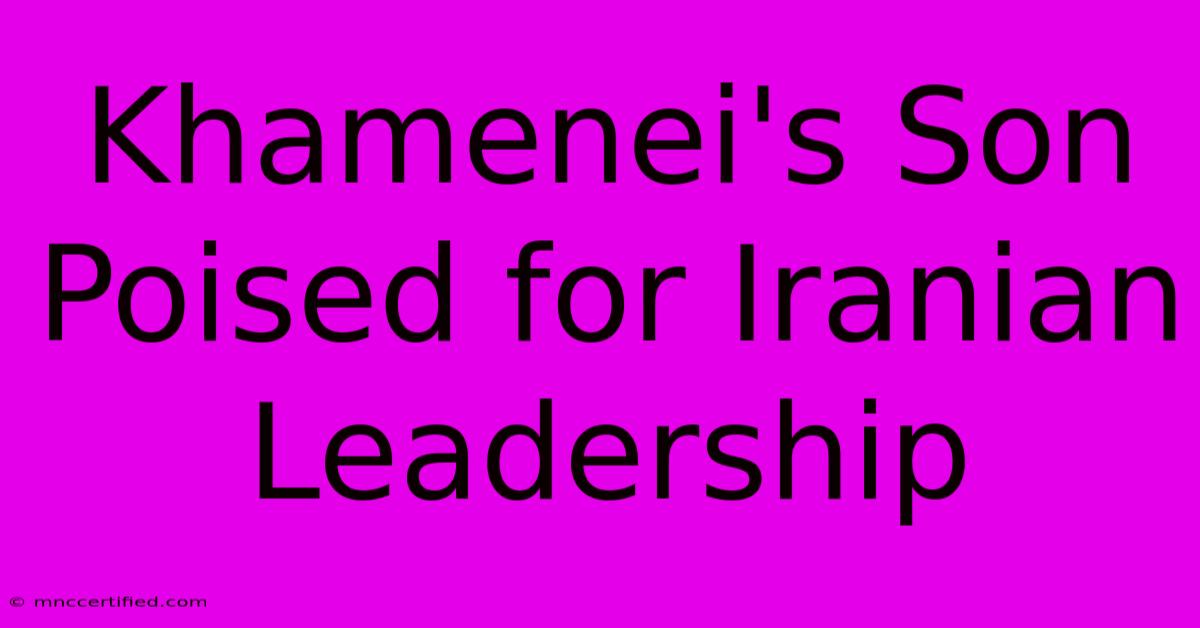Khamenei's Son Poised For Iranian Leadership

Table of Contents
Khamenei's Son Poised for Iranian Leadership: A Shifting Power Dynamic?
The question of who will succeed Ayatollah Ali Khamenei as Supreme Leader of Iran has long been a subject of intense speculation. While no clear successor has been publicly named, the increasing prominence of his son, Mojtaba Khamenei, fuels considerable debate and anxiety both within Iran and internationally. This article will delve into the potential implications of Mojtaba Khamenei's ascension to power, analyzing the factors that contribute to his growing influence and the potential challenges he might face.
Mojtaba Khamenei: A Rising Figure in Iranian Politics
Unlike his father, Mojtaba Khamenei has avoided the traditional clerical path. He lacks the extensive religious scholarship typically associated with Supreme Leaders. However, his influence stems from his close proximity to his father and his increasingly visible role within the Iranian power structure. He's known for his involvement in several key institutions, including:
- The Islamic Revolutionary Guard Corps (IRGC): Mojtaba’s relationship with the IRGC is significant. The IRGC's powerful influence on Iranian domestic and foreign policy suggests that his connection could solidify his position as a key player.
- The hardline faction within the political establishment: Mojtaba is widely considered a member of the hardline faction, aligning himself with those who favor a more conservative and less reformist approach to governance. This provides him with a substantial base of support.
- Behind-the-scenes influence: Reports suggest Mojtaba plays a significant role in shaping decisions concerning appointments and policy, even without holding any official high-ranking position. This behind-the-scenes influence is a powerful factor in his potential rise.
The Challenges Facing a Potential Khamenei Succession
While Mojtaba Khamenei’s position seems strong, several significant challenges could hinder his path to the Supreme Leadership:
- Lack of Religious Credentials: Unlike past Supreme Leaders, Mojtaba lacks the extensive religious scholarship and theological authority traditionally considered essential for the role. This could cause dissent among senior clerics.
- Public Opposition: A significant portion of the Iranian population, especially among reformists and younger generations, may oppose his leadership due to concerns about his hardline ideology and lack of democratic legitimacy. This could lead to social unrest.
- Internal Power Struggles: The Iranian political system is complex, with various factions vying for influence. Mojtaba's ascension could trigger intense power struggles within the establishment, potentially leading to instability.
- International Relations: Mojtaba's reputation as a hardliner could further complicate Iran's already strained relationships with the West, leading to increased international isolation.
The Potential Implications of his Leadership
The potential succession of Mojtaba Khamenei could significantly impact Iran's domestic and foreign policies. A hardline approach under his leadership could lead to:
- Increased repression of dissent: Human rights concerns could worsen, with stricter controls on freedom of speech and assembly.
- Escalated regional tensions: Iran's foreign policy could become more assertive, increasing tensions with neighboring countries and international powers.
- Further economic isolation: Sanctions and economic hardship could intensify under a hardline leadership.
Conclusion: Uncertain Future, High Stakes
The possibility of Mojtaba Khamenei becoming Iran's next Supreme Leader presents a complex and uncertain future for the country. While his proximity to his father and his influence within key institutions give him a strong position, numerous challenges lie ahead. His potential ascension will profoundly impact Iran's domestic and international landscape. Understanding the intricacies of Iranian politics and the potential ramifications of this succession is crucial for navigating this pivotal moment in Iranian history. Further research and analysis are needed to fully comprehend the long-term consequences. The international community will be watching closely as this power dynamic continues to evolve.

Thank you for visiting our website wich cover about Khamenei's Son Poised For Iranian Leadership. We hope the information provided has been useful to you. Feel free to contact us if you have any questions or need further assistance. See you next time and dont miss to bookmark.
Featured Posts
-
Fintechzoom Com Best Credit Cards
Nov 18, 2024
-
Italy Vs France Highlights 1 3 Victory
Nov 18, 2024
-
Melvin Odooms Love Life And Famous Sister
Nov 18, 2024
-
5 Points To Watch Lions Vs Jaguars
Nov 18, 2024
-
Live Score Wales Vs Australia Match
Nov 18, 2024